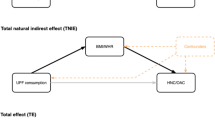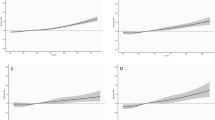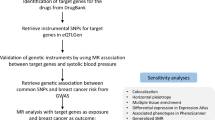Abstract
Purpose
Xenobiotic metabolism is related to the interplay between diet and breast cancer (BC) risk. This involves detoxification enzymes, which are polymorphic and metabolise various dietary metabolites. An important characteristic of this pathway is that chemoprotective micronutrients can act not only as substrates but also as inducers for these enzymes. We investigated whether functional GSTP1 (p.Ile105Val-rs1695), NAT2 (590G>A-rs1799930) SNPs and GSTM1 and GSTT1 deletion polymorphisms could modulate the effect of the Mediterranean diet (MD) on BC risk, in Greek-Cypriot women.
Methods
Genotyping was performed on women from the MASTOS case–control study of BC in Cyprus. A 32-item food-frequency questionnaire was used to obtain dietary intake information. A dietary pattern, which closely resembles the MD (high loadings of vegetables, fruit, legumes and fish), was previously derived with principal component analysis and was used as our dietary variable.
Results
GSTT1 null genotype increased BC risk compared with the homozygous non-null GSTT1 genotype (OR 1.21, 95 % CI 1.01–1.45). Increasing adherence to the MD reduced BC risk in women with at least one GSTP1 Ile allele (OR for Ile/Ile = 0.84, 95 % CI 0.74–0.95, for Ile/Val = 0.73, 95 % CI 0.62–0.85) or one NAT2 590G allele (OR for 590 GG = 0.73, 95 % CI 0.63–0.83, for 590 GA = 0.81, 95 % CI 0.70–0.94). p interaction values were not, however, statistically significant.
Conclusion
The homozygous null GSTT1 genotype could be a risk allele for BC among Greek-Cypriot women. The anticarcinogenic effects of the high adherence to MD against BC risk could also be further enhanced when combined with the wild-type alleles of the detoxification GSTP1 or NAT2 SNPs.

Similar content being viewed by others
References
Albuquerque RC, Baltar VT, Marchioni DM (2014) Breast cancer and dietary patterns: a systematic review. Nutr Rev 72(1):1–17. doi:10.1111/nure.12083
Brennan SF, Cantwell MM, Cardwell CR, Velentzis LS, Woodside JV (2010) Dietary patterns and breast cancer risk: a systematic review and meta-analysis. Am J Clin Nutr 91(5):1294–1302. doi:10.3945/ajcn.2009.28796
Gerber M (2003) Biofactors in the Mediterranean diet. Clin Chem Lab Med 41(8):999–1004. doi:10.1515/CCLM.2003.153
Ortega R (2006) Importance of functional foods in the Mediterranean diet. Public Health Nutr 9(8A):1136–1140. doi:10.1017/s1368980007668530
Simopoulos AP (2004) The traditional diet of Greece and cancer. Eur J Cancer Prev 13(3):219–230
Vera-Ramirez L, Ramirez-Tortosa MC, Sanchez-Rovira P, Ramirez-Tortosa CL, Granados-Principal S, Lorente JA, Quiles JL (2013) Impact of diet on breast cancer risk: a review of experimental and observational studies. Crit Rev Food Sci Nutr 53(1):49–75. doi:10.1080/10408398.2010.521600
Gago-Dominguez M, Castelao JE, Sun CL, Van Den Berg D, Koh WP, Lee HP, Yu MC (2004) Marine n-3 fatty acid intake, glutathione S-transferase polymorphisms and breast cancer risk in post-menopausal Chinese women in Singapore. Carcinogenesis 25(11):2143–2147. doi:10.1093/carcin/bgh230
Demetriou CA, Hadjisavvas A, Loizidou MA, Loucaides G, Neophytou I, Sieri S, Kakouri E, Middleton N, Vineis P, Kyriacou K (2012) The mediterranean dietary pattern and breast cancer risk in Greek-Cypriot women: a case-control study. BMC Cancer 12:113. doi:10.1186/1471-2407-12-113
Reszka E, Wasowicz W, Gromadzinska J (2006) Genetic polymorphism of xenobiotic metabolising enzymes, diet and cancer susceptibility. Br J Nutr 96(4):609–619
Steck SE, Hebert JR (2009) GST polymorphism and excretion of heterocyclic aromatic amine and isothiocyanate metabolites after Brassica consumption. Environ Mol Mutagen 50(3):238–246. doi:10.1002/em.20456
Lampe JW (2009) Interindividual differences in response to plant-based diets: implications for cancer risk. Am J Clin Nutr 89(5):1553S–1557S. doi:10.3945/ajcn.2009.26736D
Lin J, Kamat A, Gu J, Chen M, Dinney CP, Forman MR, Wu X (2009) Dietary intake of vegetables and fruits and the modification effects of GSTM1 and NAT2 genotypes on bladder cancer risk. Cancer Epidemiol Biomark Prev 18(7):2090–2097. doi:10.1158/1055-9965.EPI-08-1174
Wang J, Joshi AD, Corral R, Siegmund KD, Marchand LL, Martinez ME, Haile RW, Ahnen DJ, Sandler RS, Lance P, Stern MC (2012) Carcinogen metabolism genes, red meat and poultry intake, and colorectal cancer risk. Int J Cancer 130(8):1898–1907. doi:10.1002/ijc.26199
Steinbrecher A, Rohrmann S, Timofeeva M, Risch A, Jansen E, Linseisen J (2010) Dietary glucosinolate intake, polymorphisms in selected biotransformation enzymes, and risk of prostate cancer. Cancer Epidemiol Biomark Prev 19(1):135–143. doi:10.1158/1055-9965.EPI-09-0660
Ali-Osman F, Akande O, Antoun G, Mao JX, Buolamwini J (1997) Molecular cloning, characterization, and expression in Escherichia coli of full-length cDNAs of three human glutathione S-transferase Pi gene variants. Evidence for differential catalytic activity of the encoded proteins. J Biol Chem 272(15):10004–10012
Jancova P, Anzenbacher P, Anzenbacherova E (2010) Phase II drug metabolizing enzymes. Biomed Pap 154(2):103–116
Seow A, Vainio H, Yu MC (2005) Effect of glutathione-S-transferase polymorphisms on the cancer preventive potential of isothiocyanates: an epidemiological perspective. Mutat Res 592(1–2):58–67. doi:10.1016/j.mrfmmm.2005.06.004
Egeberg R, Olsen A, Autrup H, Christensen J, Stripp C, Tetens I, Overvad K, Tjonneland A (2008) Meat consumption, N-acetyl transferase 1 and 2 polymorphism and risk of breast cancer in Danish postmenopausal women. Eur J Cancer Prev 17(1):39–47. doi:10.1097/CEJ.0b013e32809b4cdd
Schwingshackl L, Hoffmann G (2014) Adherence to Mediterranean diet and risk of cancer: a systematic review and meta-analysis of observational studies. Int J Cancer 135(8):1884–1897. doi:10.1002/ijc.28824
Aune D, Chan DS, Vieira AR, Rosenblatt DA, Vieira R, Greenwood DC, Norat T (2012) Fruits, vegetables and breast cancer risk: a systematic review and meta-analysis of prospective studies. Breast Cancer Res Treat 134(2):479–493. doi:10.1007/s10549-012-2118-1
Kakkoura MG, Demetriou CA, Loizidou MA, Loucaides G, Neophytou I, Marcou Y, Hadjisavvas A, Kyriacou K (2015) Single-nucleotide polymorphisms in one-carbon metabolism genes, Mediterranean diet and breast cancer risk: a case-control study in the Greek-Cypriot female population. Genes Nutr 10(2):453. doi:10.1007/s12263-015-0453-7
Kakkoura MG, Demetriou CA, Loizidou MA, Loucaides G, Neophytou I, Malas S, Kyriacou K, Hadjisavvas A (2015) MnSOD and CAT polymorphisms modulate the effect of the Mediterranean diet on breast cancer risk among Greek-Cypriot women. Eur J Nutr. doi:10.1007/s00394-015-0971-5
Hadjisavvas A, Loizidou MA, Middleton N, Michael T, Papachristoforou R, Kakouri E, Daniel M, Papadopoulos P, Malas S, Marcou Y, Kyriacou K (2010) An investigation of breast cancer risk factors in Cyprus: a case control study. BMC Cancer 10:447. doi:10.1186/1471-2407-10-447
Loizidou MA, Cariolou MA, Neuhausen SL, Newbold RF, Bashiardes E, Marcou Y, Michael T, Daniel M, Kakouri E, Papadopoulos P, Malas S, Hadjisavvas A, Kyriacou K (2010) Genetic variation in genes interacting with BRCA1/2 and risk of breast cancer in the Cypriot population. Breast Cancer Res Treat 121(1):147–156. doi:10.1007/s10549-009-0518-7
Ambrosone CB, Sweeney C, Coles BF, Thompson PA, McClure GY, Korourian S, Fares MY, Stone A, Kadlubar FF, Hutchins LF (2001) Polymorphisms in glutathione S-transferases (GSTM1 and GSTT1) and survival after treatment for breast cancer. Cancer Res 61(19):7130–7135
Sole X, Guino E, Valls J, Iniesta R, Moreno V (2006) SNPStats: a web tool for the analysis of association studies. Bioinformatics 22(15):1928–1929. doi:10.1093/bioinformatics/btl268
Sergentanis TN, Economopoulos KP (2010) GSTT1 and GSTP1 polymorphisms and breast cancer risk: a meta-analysis. Breast Cancer Res Treat 121(1):195–202. doi:10.1007/s10549-009-0520-0
Chen XX, Zhao RP, Qiu LX, Yuan H, Mao C, Hu XC, Guo XM (2011) Glutathione S-transferase T1 polymorphism is associated with breast cancer susceptibility. Cytokine 56(2):477–480. doi:10.1016/j.cyto.2011.06.008
Karen-Ng LP, Marhazlinda J, Rahman ZA, Yang YH, Jalil N, Cheong SC, Zain RB (2011) Combined effects of isothiocyanate intake, glutathione S-transferase polymorphisms and risk habits for age of oral squamous cell carcinoma development. Asian Pac J Cancer Prev 12(5):1161–1166
Liu JJ, Liu JL, Zhang X, Xie L, Zeng J (2013) A meta-analysis of the association of glutathione S-transferase P1 gene polymorphism with the susceptibility of breast cancer. Mol Biol Rep 40(4):3203–3212. doi:10.1007/s11033-012-2396-z
Vogl FD, Taioli E, Maugard C, Zheng W, Pinto LF, Ambrosone C, Parl FF, Nedelcheva-Kristensen V, Rebbeck TR, Brennan P, Boffetta P (2004) Glutathione S-transferases M1, T1, and P1 and breast cancer: a pooled analysis. Cancer Epidemiol Biomark Prev 13(9):1473–1479
Zhang J, Qiu LX, Wang ZH, Wang JL, He SS, Hu XC (2010) NAT2 polymorphisms combining with smoking associated with breast cancer susceptibility: a meta-analysis. Breast Cancer Res Treat 123(3):877–883. doi:10.1007/s10549-010-0807-1
Lu S, Wang Z, Cui D, Liu H, Hao X (2011) Glutathione S-transferase P1 Ile105Val polymorphism and breast cancer risk: a meta-analysis involving 34,658 subjects. Breast Cancer Res Treat 125(1):253–259. doi:10.1007/s10549-010-0969-x
Ochs-Balcom HM, Wiesner G, Elston RC (2007) A meta-analysis of the association of N-acetyltransferase 2 gene (NAT2) variants with breast cancer. Am J Epidemiol 166(3):246–254. doi:10.1093/aje/kwm066
Lee SA, Fowke JH, Lu W, Ye C, Zheng Y, Cai Q, Gu K, Gao YT, Shu XO, Zheng W (2008) Cruciferous vegetables, the GSTP1 Ile105Val genetic polymorphism, and breast cancer risk. Am J Clin Nutr 87(3):753–760
Fowke JH, Chung FL, Jin F, Qi D, Cai Q, Conaway C, Cheng JR, Shu XO, Gao YT, Zheng W (2003) Urinary isothiocyanate levels, brassica, and human breast cancer. Cancer Res 63(14):3980–3986
Steck SE, Gaudet MM, Britton JA, Teitelbaum SL, Terry MB, Neugut AI, Santella RM, Gammon MD (2007) Interactions among GSTM1, GSTT1 and GSTP1 polymorphisms, cruciferous vegetable intake and breast cancer risk. Carcinogenesis 28(9):1954–1959. doi:10.1093/carcin/bgm141
Perez-Lopez FR, Chedraui P, Haya J, Cuadros JL (2009) Effects of the Mediterranean diet on longevity and age-related morbid conditions. Maturitas 64(2):67–79. doi:10.1016/j.maturitas.2009.07.013
Gago-Dominguez M, Jiang X, Castelao JE (2007) Lipid peroxidation, oxidative stress genes and dietary factors in breast cancer protection: a hypothesis. Breast Cancer Res 9(1):201. doi:10.1186/bcr1628
Navarro SL, Li F, Lampe JW (2011) Mechanisms of action of isothiocyanates in cancer chemoprevention: an update. Food Funct 2(10):579–587. doi:10.1039/c1fo10114e
Ambrosone CB, Tang L (2009) Cruciferous vegetable intake and cancer prevention: role of nutrigenetics. Cancer Prev Res 2(4):298–300. doi:10.1158/1940-6207.CAPR-09-0037
Zhao H, Lin J, Grossman HB, Hernandez LM, Dinney CP, Wu X (2007) Dietary isothiocyanates, GSTM1, GSTT1, NAT2 polymorphisms and bladder cancer risk. Int J Cancer 120(10):2208–2213. doi:10.1002/ijc.22549
Gervasini G, San Jose C, Carrillo JA, Benitez J, Cabanillas A (2010) GST polymorphisms interact with dietary factors to modulate lung cancer risk: study in a high-incidence area. Nutr Cancer 62(6):750–758. doi:10.1080/01635581003605946
Wang LI, Giovannucci EL, Hunter D, Neuberg D, Su L, Christiani DC (2004) Dietary intake of Cruciferous vegetables, Glutathione S-transferase (GST) polymorphisms and lung cancer risk in a Caucasian population. Cancer Causes Control 15(10):977–985
Joseph MA, Moysich KB, Freudenheim JL, Shields PG, Bowman ED, Zhang Y, Marshall JR, Ambrosone CB (2004) Cruciferous vegetables, genetic polymorphisms in glutathione S-transferases M1 and T1, and prostate cancer risk. Nutr Cancer 50(2):206–213. doi:10.1207/s15327914nc5002_11
Spitz MR, Duphorne CM, Detry MA, Pillow PC, Amos CI, Lei L, de Andrade M, Gu X, Hong WK, Wu X (2000) Dietary intake of isothiocyanates: evidence of a joint effect with glutathione S-transferase polymorphisms in lung cancer risk. Cancer Epidemiol Biomark Prev 9(10):1017–1020
Larsson SC, Kumlin M, Ingelman-Sundberg M, Wolk A (2004) Dietary long-chain n-3 fatty acids for the prevention of cancer: a review of potential mechanisms. Am J Clin Nutr 79(6):935–945
Loizidou MA, Michael T, Neuhausen SL, Newbold RF, Marcou Y, Kakouri E, Daniel M, Papadopoulos P, Malas S, Hadjisavvas A, Kyriacou K (2009) DNA-repair genetic polymorphisms and risk of breast cancer in Cyprus. Breast Cancer Res Treat 115(3):623–627. doi:10.1007/s10549-008-0084-4
Turner F, Smith G, Sachse C, Lightfoot T, Garner RC, Wolf CR, Forman D, Bishop DT, Barrett JH (2004) Vegetable, fruit and meat consumption and potential risk modifying genes in relation to colorectal cancer. Int J Cancer 112(2):259–264. doi:10.1002/ijc.20404
Skjelbred CF, Saebo M, Hjartaker A, Grotmol T, Hansteen IL, Tveit KM, Hoff G, Kure EH (2007) Meat, vegetables and genetic polymorphisms and the risk of colorectal carcinomas and adenomas. BMC Cancer 7:228. doi:10.1186/1471-2407-7-228
FNDDS U (2011–2012) USDA food and nutrient database for dietary studies: what’s in the foods you eat search tool 2011–2012 [https://reedir.arsnet.usda.gov/codesearchwebapp/%28h1zdt555qfcnfm55pjp44h45%29/codesearch.aspx]
Wu AH, Yu MC, Tseng CC, Stanczyk FZ, Pike MC (2009) Dietary patterns and breast cancer risk in Asian American women. Am J Clin Nutr 89(4):1145–1154. doi:10.3945/ajcn.2008.26915
Acknowledgments
This work was supported by “Cyprus Research Promotion Foundation” grants 0104/13, 0104/17 and the Cyprus Institute of Neurology and Genetics. Maria G. Kakkoura is funded by the Eurobank Cyprus Scholarship provided through the Cyprus School of Molecular Medicine. Further, we would like to thank all the study participants and acknowledge the help of the following cancer patient’s organisations: the Pancyprian Association of Cancer Patients and Friends, Europa Donna Cyprus, the Cyprus Anticancer Society as well as Dr Vaios Partasides, director of the National breast cancer screening programme and his team. We also would like to express our appreciation to Doctors Eleni Kakouri, Panayiotis Papadopoulos, Yiola Marcou and Simon Malas as well as to all the nurses and volunteers who provided valuable help towards the recruitment of the study participants.
Author information
Authors and Affiliations
Corresponding author
Ethics declarations
Conflict of interest
The authors declare that they have no conflicts of interest.
Ethical standards
The study was approved by the Cyprus National Bioethics Committee. All procedures followed were in accordance with the ethical standards of the responsible committee on human experimentation (institutional and national) and with the Helsinki Declaration of 1975, as revised in 2000. Informed consent was obtained from all patients for being included in the study.
Electronic supplementary material
Below is the link to the electronic supplementary material.
Rights and permissions
About this article
Cite this article
Kakkoura, M.G., Loizidou, M.A., Demetriou, C.A. et al. The synergistic effect between the Mediterranean diet and GSTP1 or NAT2 SNPs decreases breast cancer risk in Greek-Cypriot women. Eur J Nutr 56, 545–555 (2017). https://doi.org/10.1007/s00394-015-1099-3
Received:
Accepted:
Published:
Issue Date:
DOI: https://doi.org/10.1007/s00394-015-1099-3




